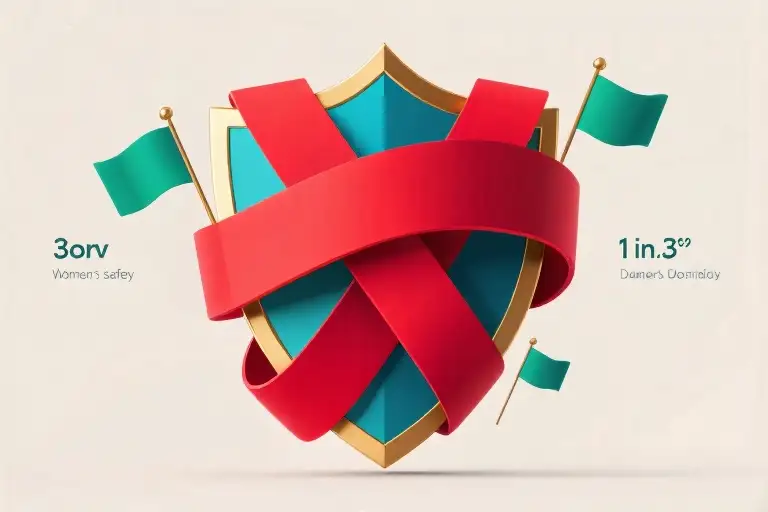The comment glared up at me from my phone screen, one of those internet grenades lobbed by a stranger who felt entitled to judge my dating history. “Hundreds of dates? Sounds like you’re unbearably picky,” it read, followed by the predictable implication that my standards must be unreasonable. Never mind that this same critic would likely applaud a man for being “selective”—when women exercise discernment, we get labeled difficult.
This double standard isn’t just annoying; it’s dangerous. Consider that one in three women globally experience physical or sexual violence, overwhelmingly perpetrated by men. When we’re called “picky” for vetting partners thoroughly, what people are really saying is that we should prioritize male comfort over our own safety. My so-called high standards? They’re not a personality flaw—they’re a survival strategy honed in a world where female intuition is often the only security system we’ve got.
Those hundreds of dates weren’t some frivolous parade of judgment. They represented careful curation—not of perfection, but of basic compatibility and safety. I own my home, run a business, and have spent years doing the messy work of self-improvement. Why shouldn’t I seek someone equally self-actualized? The alternative—lowering my standards to avoid criticism—would mean abandoning the very discernment that’s kept me safe and brought me to a loving relationship with my golden-retriever-energy partner.
Here’s what nobody tells you: Dating isn’t about giving every potential match a participation trophy. It’s a mutual selection process where two people assess compatibility. Many of those hundreds of dates ended simply because we recognized the absence of chemistry—not because I was playing some cruel rejection game. Yet when women acknowledge this natural attrition, we’re shamed for it in ways men rarely experience.
So let’s reframe the conversation. Instead of asking why women have high standards, perhaps we should question why society expects us to settle for less than we deserve—and less than what keeps us safe.
The Survival Logic Behind Hundreds of Dates
That comment about me being ‘unbearably picky’ still lingers in my mind, not because it hurt – though it did sting a bit – but because it perfectly illustrates the double standard we rarely discuss. When men are selective, they’re being prudent. When women do it, we’re labeled difficult, unrealistic, or worse.
Here’s what those critics never consider: for women, dating standards aren’t about finding the perfect partner. They’re often about avoiding danger. The statistics are sobering – one in three women worldwide will experience physical or sexual violence in their lifetime, with over 99% of perpetrators being male. These aren’t abstract numbers; they represent real lives, real trauma. When we take extra time to vet a date, when we insist on meeting in public spaces, when we walk away at the first red flag, we’re not being picky. We’re practicing basic self-preservation.
I remember one date where the guy mocked me for wanting to meet at a coffee shop instead of his apartment. ‘Don’t you trust me?’ he asked, as if trust should be automatically granted rather than earned. That interaction ended right there, and I’ve never regretted it. What some call pickiness, I call listening to the alarm bells that evolution wisely installed in every woman’s nervous system.
The double standard becomes even clearer when you compare how society views selective men versus selective women. A male friend who went on dozens of first dates was praised for ‘knowing what he wants.’ Meanwhile, my similar behavior was framed as some pathological inability to commit. This discrepancy reveals an uncomfortable truth – we still expect women to be grateful for male attention, rather than discerning about its quality.
There’s another layer to this that rarely gets discussed. Being selective isn’t just about avoiding bad matches; it’s about making space for good ones. Every date I walked away from created room for better possibilities. That’s how I eventually met my current partner – not by lowering my standards, but by maintaining them until someone truly compatible came along.
Those hundreds of dates weren’t evidence of failure or excessive pickiness. They were the necessary process of finding someone who matched my life – someone secure enough to appreciate an independent woman rather than feel threatened by her. The right person won’t complain about your standards; they’ll meet them without hesitation.
The Privilege of Standards: Why Settling Was Never an Option
Let’s address the elephant in the room first – yes, I own a home before turning thirty. Yes, I run a successful content business clearing six figures annually. And yes, I’ve spent more hours in therapy and personal development workshops than most people spend binge-watching Netflix. These aren’t bragging points; they’re context for why my dating standards might seem “high” to some observers.
There’s an unspoken rule that successful women should downplay their achievements when dating, as if our accomplishments might intimidate potential partners. But here’s the uncomfortable truth: the same men who accuse women of being “too picky” are often the ones who’d never consider dating someone beneath their own education or income level. The difference? When men are selective, it’s called having standards. When women do it, we’re being unreasonable.
My checklist wasn’t about superficial traits – it never included arbitrary requirements like height or hair color. What I sought was someone equally committed to their own growth, someone who wouldn’t expect me to shrink myself to fit their ego. I wanted a partner, not a project. Someone who understood that my ambition wasn’t negotiable, just as theirs shouldn’t be.
This became painfully clear during a date with a perfectly nice accountant who asked, halfway through dinner, whether I’d “scale back the business” if we had children. Meanwhile, he’d never considered that question might apply to his own career. That moment crystallized why being “picky” matters – not as some elitist gatekeeping, but as essential alignment of life philosophies.
Financial independence changes your dating calculus. When you’re not worried about survival, you stop evaluating partners based on what they can provide and start assessing who they are. My mortgage wasn’t just a financial asset; it was freedom to walk away from relationships that didn’t serve me. My business revenue wasn’t just a number; it was proof I didn’t need rescuing.
The irony? The more selective I became, the higher-quality connections I attracted. My current partner – the one with “golden retriever energy” – didn’t balk at my success. He matched it with his own quiet confidence, the kind that comes from having done his own emotional work. We didn’t settle for each other; we recognized ourselves in one another.
Perhaps this is what critics misunderstand about “high standards” – they’re not a barrier to love, but a compass toward it. Every “no” to mediocrity was a step closer to a meaningful “yes.” And if that makes me picky, then I’ll wear that label as the badge of honor it truly is.
When Dates Don’t Work Out: The Beauty of Mutual Elimination
The comment section erupted when I mentioned going on hundreds of dates. What those critics failed to understand is that most first dates are designed to fail – and that’s perfectly healthy. Dating isn’t about collecting trophies; it’s about finding alignment through elimination.
Take the architect who proudly declared he’d never vote for a woman president. Our dinner lasted exactly forty-seven minutes (I checked my watch when his political rant hit the ten-minute mark). The bill came, we split it evenly, and exchanged the universal ‘this isn’t going anywhere’ smile. No harm, no foul – just two people recognizing they inhabit different moral universes.
Statistically speaking, this outcome makes complete sense. Research from dating apps shows users swipe right on less than 14% of profiles. Even after matching, only 25% of conversations lead to actual dates. Of those first dates, a mere 17% result in second meetings. When you do the math, expecting every encounter to blossom into romance is like expecting every grocery store sample to turn into a five-course meal.
The coffee date with the professional gamer taught me the most about gracious incompatibility. We bonded over our love of strategy games but hit an impasse when discussing life priorities. ‘I need at least four uninterrupted hours daily for raids,’ he said with complete seriousness. I admired his self-awareness even as I mentally exited the conversation. We parted with genuine well-wishes – him to his gaming guild, me to my next date.
These non-starters aren’t failures; they’re friction points revealing fundamental mismatches early. Every polite goodbye to someone decent-but-not-right creates space for better alignment later. The hundreds became dozens became meaningful few because each elimination refined my understanding of what actually matters.
Modern dating culture often mislabels this process as ‘being too picky,’ but that framing assumes the goal is to make something work rather than to recognize what won’t. There’s profound freedom in releasing the pressure to force connections. The dates that didn’t lead anywhere served their purpose perfectly – they eliminated the wrong possibilities so the right one could emerge.
When Standards Become Shields
The comment section erupted when I mentioned my dating history. “Hundreds of dates? You must be intolerably picky,” one man declared, as if my selectivity was a character flaw rather than a conscious choice. What these critics miss is that for women, dating standards aren’t whims—they’re survival tools.
Safety as Non-Negotiable
Let’s start with the uncomfortable truth: 1 in 3 women globally experience physical or sexual violence, predominantly from male perpetrators. This statistic isn’t meant to demonize men, but to explain why women approach dating with calibrated caution. My “pickiness” includes screening for:
- Location instincts: First dates always in crowded cafes, never secluded bars. I learned this after a coffee meetup where my date kept “forgetting” his wallet—a small red flag that hinted at larger entitlement issues.
- Information hygiene: Sharing ride details with friends isn’t paranoia; it’s protocol. Like the time a date insisted on picking me up despite my refusal, his “chivalry” setting off alarm bells.
- Sobriety boundaries: I no longer apologize for nursing one drink all night. Alcohol clouds judgment, and as researcher Sarah Everard’s tragedy reminds us, vulnerability assessments aren’t overreactions.
These aren’t arbitrary rules—they’re the armor women forge through lived experience.
The Comeback Playbook
When confronted about being “too selective,” I’ve found these responses disarm critics while affirming boundaries:
- The Data Defense:
“With 1 in 3 women facing violence, wouldn’t you want your sister screening dates carefully?”
Anchoring standards in universally relatable concern often silences objections. - The Mirror Technique:
“Isn’t it interesting we never question men who refuse to date smokers or non-graduates?”
Highlighting the double standard forces introspection. - The Unapologetic Ownership:
“My life is full—a partner must add value, not just fill a slot.”
This works particularly well when paired with visible career success (mentioning my business casually tends to shut down “you’re too demanding” lectures).
The Liberation in Saying No
There’s an unexpected power in those unsuccessful dates critics weaponize against me. Each “meh” coffee date that didn’t lead to a second meeting was a victory—proof I’d rather be alone than compromise. Like the investment banker who scoffed at my writing career (“Cute hobby, but when will you get a real job?”), or the artist who expected me to fund his “potential.” Walking away from mismatches isn’t failure; it’s the dating equivalent of a good spam filter.
My current partner—the one with “golden retriever energy” those commenters mocked—earned his place by meeting standards, not circumventing them. He knows my selectiveness isn’t about arrogance, but about the radical act of valuing my own safety and happiness equally. That’s the paradox these critics miss: the women they label “too picky” are often the ones who’ve done the work to deserve exactly what they demand.
When Standards Become Shields
The comment section erupted when I mentioned going on hundreds of dates. Keyboard warriors declared me “unbearably picky,” as if carefully choosing who enters my life were some personal failing rather than basic common sense. What those critics failed to grasp – what so many deliberately ignore – is that for women, selectivity isn’t superficial preference. It’s armor.
My dating standards have filtered out more than incompatible personalities. They’ve screened for basic human decency, for men who understand enthusiastic consent, for partners who don’t perceive my independence as threatening. The golden retriever energy my boyfriend possesses? That came packaged with emotional availability and respect for boundaries – qualities my so-called “pickiness” helped identify.
Survival strategy sounds dramatic until you consider the numbers. One in three. That’s how many women experience physical or sexual violence in their lifetime. Over ninety-nine percent of perpetrators? Men. When women develop discerning dating habits, we’re not being difficult. We’re practicing risk management with our literal safety on the line.
Yet society still frames male selectivity as “knowing his worth” while female standards become “unrealistic expectations.” The double standard would be laughable if the consequences weren’t so dangerous. My checklist wasn’t about finding someone perfect – just someone who wouldn’t make me another statistic.
Your standards have protected you too, whether you realize it or not. That first date you ended early because his jokes made your skin crawl? The relationship you walked away from when respect started slipping? Those weren’t missed connections. Those were bullets dodged.
So to anyone clutching their pearls over my dating history: my selectivity wasn’t the problem. The real issue is why women needing to be this careful doesn’t outrage you more. My standards did exactly what they were meant to do – they filtered out risk and left space for genuine respect.
When have your boundaries protected you better than any dating advice ever could?





